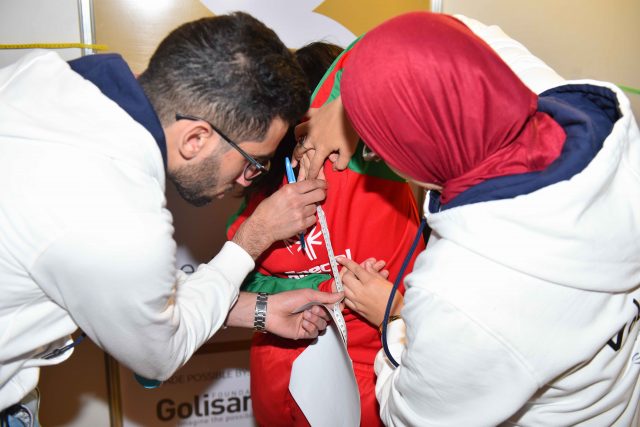It has been two years since the Special Olympics World Games in Abu Dhabi, a milestone event that helped to drastically alter perceptions of people with intellectual disabilities in the UAE and wider MENA region.
But the work done by the Special Olympics to shatter stereotypes has continued long after the sporting showpiece finished. And it is vital: as the 2018-19 Special Olympics Health Prevalence Report, which surveyed athletes from around the world, found, significant health inequality exists between different regions, and between those who have intellectual disabilities and those who don't.
In the MENA region, people with intellectual disabilities were 3.8 times more likely to have blocked or partially blocked ear canals than those in Latin America and 5.7 times more likely to have untreated tooth decay than those in North America. These are only a couple of the numerous disparities, many of which can lead to serious health problems.
Leila El Shenawy, health manager at Special Olympics MENA for the past five years, is aiming to reduce those disparities. On the UN International Day of Persons with Disabilities (December 3), a key issue for many people with intellectual disabilities is access to healthcare, while those who do get access are often treated the same as those with physical disabilities despite having significantly different healthcare needs.
"I think there is a general problem with healthcare policy around the world that makes people with intellectual disabilities less of a priority than other parts of the population," says El Shenawy.
"In countries without health insurance, people with intellectual disabilities don't have the priority in any screenings -- and governments don't tend to focus campaigns on them either.

Health checks are a big part of the Special Olympics legacy work/Image courtesy Special Olympics
"Many governments often put all disabilities together when they are implementing new policies or making changes to health services. They don't distinguish between them, when in reality the approach should be totally different."
El Shenawy and the Special Olympics believe that education is the catalyst for widespread change. As part of its Healthy Communities initiative, the organization has been training healthcare students, professionals and volunteers to better understand the needs of those with intellectual disabilities.
"There is not enough training in the healthcare sectors -- not all the countries in MENA are equipped. Of course, the Gulf countries have better technology and training, but the likes of Mauritania, Sudan, Oman -- they are not as well developed in this field.
"A major challenge for people with intellectual disabilities is that they struggle to explain how they feel and so they just cope with the health issue they have. Doctors and nurses need a better understanding of how to treat them -- even down to seemingly simple things, like smiling or speaking more slowly."
In El Shenawy's experience, the Healthy Communities program works particularly effectively when governments and universities come together to promote changes in education. A joint project between the Hashemite University of Jordan and the country's Ministry of Health is among many global success stories, with students at the institution taking a Special Olympics Healthy Community module as part of their degree.
"One of our main goals is that we change the curricula in universities around the world, and what we've done in Jordan is a blueprint that we want to follow," El Shenewy explains.
"There are volunteer opportunities as part of the course and students have the opportunity to actually meet and treat people with intellectual disabilities. For many of them, is the first time they've done so."
When the Special Olympics World Games took place in Abu Dhabi, part of the UAE's responsibility as host was to roll out a host of education programs, and El Shenewy believes it led to 2019 being a watershed year for the country.

Health checks are a big part of the Special Olympics legacy work/Image courtesy Special Olympics
"It was a great push and totally changed the mindset in the UAE I think. It was brand new for a lot of people but we were really well supported by the government.
"I think many assumed the Special Olympics would just be a one-time event. However the legacy is crucial and the event had a year of activities and activations around it that benefit the athletes and other people with intellectual disabilities in the UAE."
Since 2016 the Special Olympics has also been training a number of its athletes to be "Health Messengers", and there are now more than 60 advocates in MENA. They encourage families, friends, and communities to pursue healthy lifestyles, as well as pushing healthcare providers and governments to adopt inclusive policies around health for people with intellectual disabilities.
Saif Al Qubaisi is a Special Olympics UAE golfer and Health Messenger.
"We learn about health, precautions and fitness as a lifestyle and during Covid we have continued connecting from the safety of our homes," says Al Qubaisi.
"During the pandemic, we've also had virtual trainings on how to improve our social, emotional and mental well-being. We met every week to stay connected. As a health messenger, the pandemic made me realise how important it is for athletes to lead our local communities towards heathier lifestyles."
The Health Messengers program evolved to become an integral part of the Special Olympics' approach to community education, and El Shenewy feels the messengers are now arguably the best weapon the organization has in the fight to end health disparity.
"I think we have a very strong program and when we are approaching partners or communities, having a Health Messenger there is really the best thing," she says.
"When they share their stories and talk about how they compete and how they have changed people's mindsets, it is inspirational. We are proud of this impact."

No comments:
Post a Comment